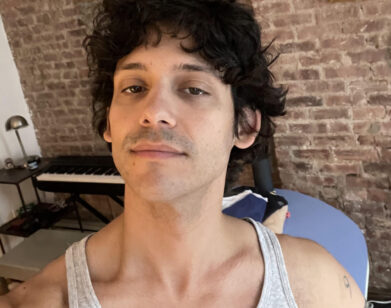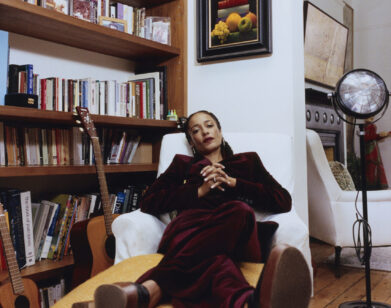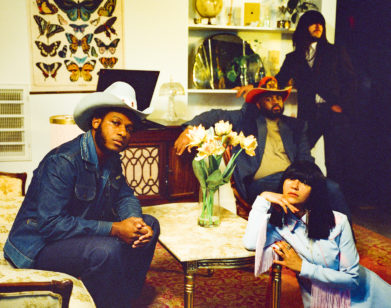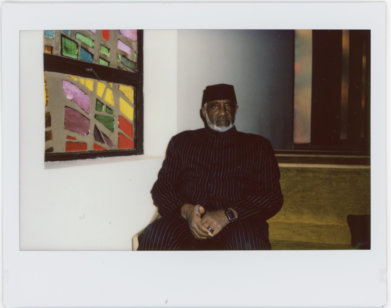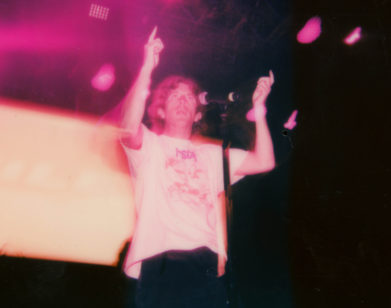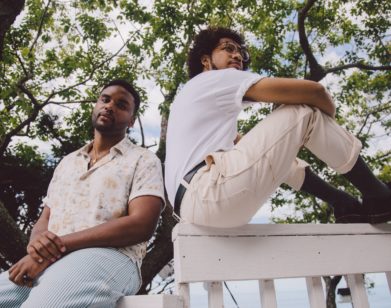in conversation
Khruangbin’s Laura Lee and Kadhja Bonet on Crafting the Perfect Remix
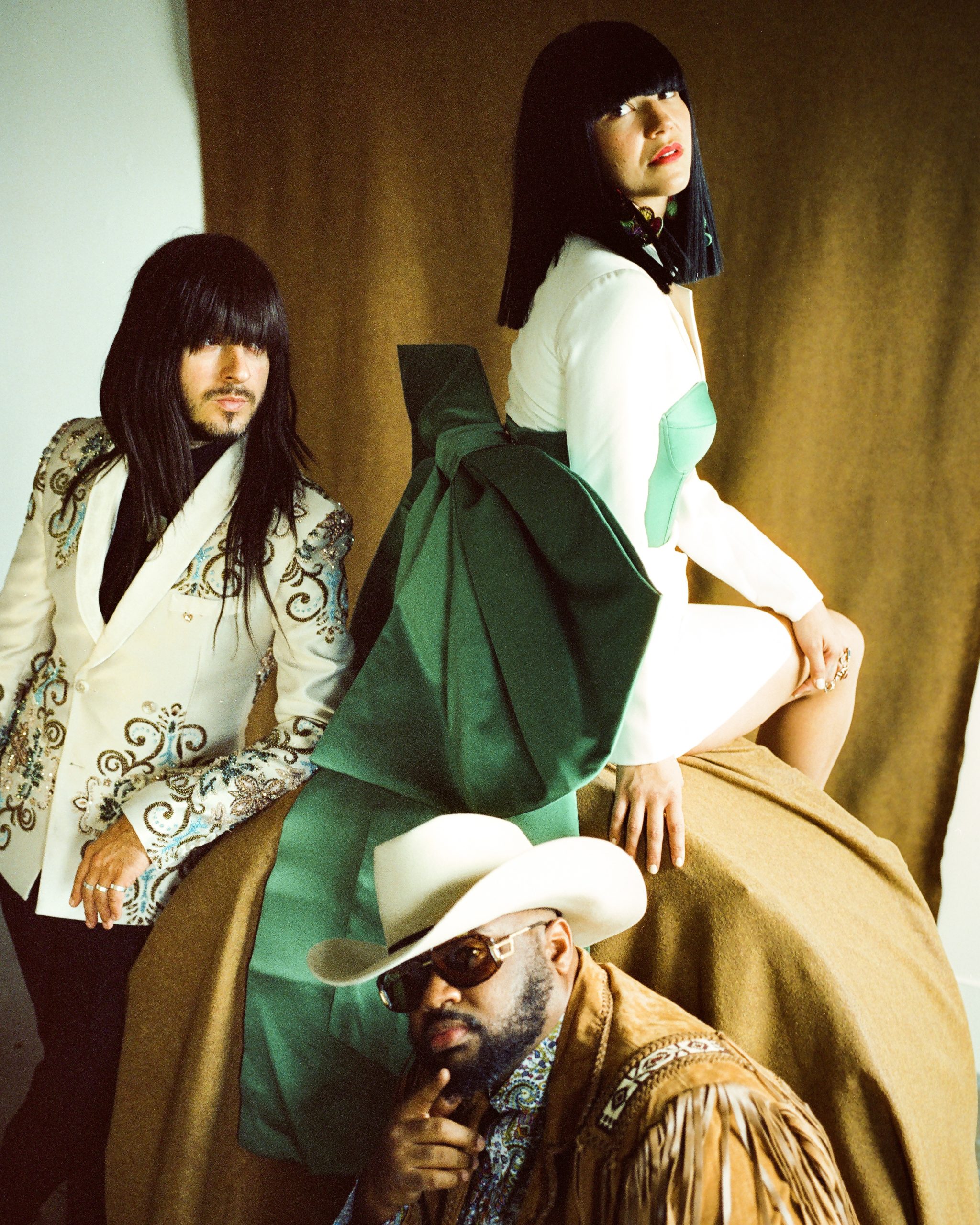
Photo courtesy Khruangbin.
Over Khruangbin’s ten year career, the Texas-born trio—made up of guitarist Mark Speer, bassist Laura Lee, and drummer Donald Johnson, Jr.—has garnered a reputation for being deft musical shape shifters. Their 2015 debut, The Universe Smiles Upon You, drew on Thai country music traditions of the ‘60s, while their sophomore record, Con Todo El Mundo, weaved together Latin American and Middle Eastern influences. Consistent across the trio’s three-album discography, however, is an immersive, cinematic quality—layered instrumentation and hazy vocals combine to create lush sonic universes that float and spill through space.
Though their global swirl of psychedelic, funk and soul sounds are responsible for the band’s seemingly universal appeal, Khruangbin’s members prefer to keep their distance from stardom. A self-dubbed trio of “introverts,” Lee and Speer famously don long black wigs when performing to obscure their identities, and all three tend hunker down after a show rather than make the typical after party rounds. This preference for privacy may be the motivation behind Khruangbin’s consistent collaborations with solo artists—such as Leon Bridges—who are more at home in the limelight. Late last week, the band released Mordechai Remixes, a reimagined version of their 2020 record that perfectly encapsulates this collaborative spirit by putting the musical interpretations of artists and producers like Quantic, Soul Clap, Knxwledge, and others center stage. For Lee, the project was the perfect way to honor the band’s communal approach to music-making during a year of isolation. Here, she tells Kadhja Bonet— the singer songwriter whose remix of “Father Bird, Mother Bird” opens the album—why “every remix on the record is a gift.”
———
LAURA LEE: This is so different from a regular interview. It’s nice to talk to somebody I respect so much and that I have a connection to.
KHADJA BONET: How funny is it that this is our first actual conversation face to face? I am nervous talking to you. You’re such an intimidating wonderful presence.
LEE: It’s part of the reason I made this character, Laura Leezy. It helps the insecure, not-so-powerful feeling person in me to embrace all of this.
BONET: It’s super badass.
LEE: It’s definitely like my drag. But I’m such a fan of yours. There are so many insecurities that I have as a musician, and you have all the things that would make me more secure.
BONET: God. Absolutely not. I’m always terrified that I don’t have some components that I need. So, what’s the ultimate remix in your mind?
LEE: I don’t necessarily think remixes have to be a particular thing, I think that covers sometimes feel like remixes. Like, Bobby Womack singing “Fly Me to the Moon” feels like a remix or a cover to me, because it’s a complete reworking of the song. He took the details that he likes and made it his own. I don’t know if you’ve done other remixes, but I want to know how you approached reworking “Father Bird, Mother Bird.” What was your first step?
BONET: This is the only remix I’ve done, and I was really scared. I tried to figure out which parts I could put into my voice—when you’re reworking something, you have to figure out which parts of it can fit you. So like, the guitar line fits the type of world that I like to build— can I borrow that? I tried to go through each part of the song and build around it from there.
LEE: What I liked about your remix particularly was that you re-recorded everything. It didn’t sound like you have any of the original elements. At what point did the words come to you, and how did you come to them?
BONET: The words probably came towards the end of the process, and that’s not how I usually do it—usually the words come in little fragments as I go. This time, I had the title, “Father Bird, Mother Bird,” in my head. I wanted to give this feeling, like ghostriding the whip on shrooms. That’s how I wanted people to feel, so I was playing with imagery of shadows and birds.
LEE: Mordechai played with words more than we ever had before, and yours was one of the songs we left purely instrumental. We record in a barn on this farm, and we were on the porch one night when we saw two lovebirds flying around. They were constantly together, and one day we saw just the male bird and he was making a lot of noise and flapping his wings. I was like, “Where’s his woman?” It felt like he was missing her, and I got really sad that night. The next morning I heard their three baby birds. That was one of the things I love about recording in nature and away from everything.
BONET: I’ve experienced mice scampering across a piano before but never baby birds.
LEE: The way that your lyrics came out felt like it really honored the experience of the birds.
BONET: Did you feel precious about any of the songs before the reworks? Were you worried about how they would come out or did you feel like you might lose too much of the Khruangbin voice in anything?
LEE: No, I’ve been working in a curatorial way for a really long time. Before I even started making music, I worked in museums for several years. I curate all of the posters and artwork that Khruangbin uses. And what I find the best thing you can do when you’re working with an artist is to give them freedom. It was a joy for us to see what people did with the songs. Truly, every remix on the record is a gift. When I think of which remix really just blew me away, yours is always the one that comes to mind. It’s so beautiful and it was such an honor to watch you play it live. We really hope that you’ll be up for playing it with us.
BONET: I would love that.
LEE: You record all the instruments on your albums pretty much?
BONET: I write everything, but I’m not a polished musician, so there are times when I need somebody with a different touch. I really enjoy the luxury of modern technology— I can go in like bar by bar and tweak things.
LEE: Neither am I. Jazz musicians or more academically trained musicians bring out my real insecurity, because it’s not me at all. Thundercat watched our whole set at JazzFest, and I was so nervous to play in front of someone who really knows their instrument inside and out.
BONET: “The jazz musicians are going to find me out!”
LEE: Do you feel precious when you have to play a song live, and you have to get other people to play with you? What does that process look like?
BONET: I’m getting better about that. I used to be way stricter and be like, “No, play the bass line exactly this way.” But now that I’m a mom, I don’t have the same bandwidth. I’ve become much more laid back about those things, and realized that it’s much more enjoyable that way.
LEE: Do you still plan to tour now that you’re a mother?
BONET: We’re trying to take it piece by piece. Right now, a tour would probably be too much. I have a one and a half-year-old and he’s still nursing, so probably in a year or so I’ll be able to travel.
LEE: I’m childless at this point, but I’m always looking ahead and thinking, “Okay, how would this work for me?” I wouldn’t want to stop performing, and I also think it would be important for my child to see me play. I read that your dad is an opera singer.
BONET: During my lifetime and he wasn’t a big shot opera guy, he was more like a voice teacher. He also ran a flower stand and sold used cars.
LEE: Did he give you voice lessons?
BONET: We tried it a couple of times and it did not work. It was quite traumatic. He was really overbearing, opinionated father— I miss him of course, but the criticism still lives on in me.
LEE: I don’t have a relationship with my father, unfortunately. When I started the band, he had nothing positive to say. He recently got in touch with me to tell me that I’d finally written a song that he enjoys. I was like, “Cool, I’ve been working all this time just to please you.” [Laughs]
BONET: What do you think is the power of a good remix?
LEE: Perspective. It’s like giving five chefs the same ingredients and seeing how each one plays with them. I think that it’s a really beautiful process. We decided we were going to make the remix record before the pandemic, but it ended up being the perfect project for this time, because it was something that everybody could work on in isolation. I really love collaborations. I’m in a band, which is a collaboration in itself, but I love what happens when you blend different minds.
BONET: You always have the sickest artists working on your posters and album covers. Was Mordechai the first time that you created the cover art yourself?
LEE: I’ve been doing portraits of our collaborators since our first record. In the gatefold for Mordechai Remixes, I drew everybody that contributed to the album in some way. Management, label, et cetera, but also friends that supported us. So, when it came to this remix package, it seemed fitting that I would draw all of the remixers. I try with every record to give as much of myself as I can, and sometimes that puts me in a vulnerable place. The illustrations are imperfect, and making them feels really intimate. Do you draw all of your covers?
BONET: I’m steering away from that now— I’m in a new phase of collaborating more. It mostly happened that way because I’m an introvert and I’m afraid of everybody.
LEE: I think that’s common with artists. Recently, I’ve been approached by several people to throw us parties after our shows. I keep warning them, like, “Guys, we’re really socially awkward and we don’t want to talk to anybody.” [Laughs] I remember Blood Orange did a really big, beautiful concert performance in New York a couple of years ago, and I messaged him to congratulate him, and he was like, “I left my own afterparty and I’m riding my bike around New York City.” I completely relate to that.
BONET: What is your recording process like?
LEE: We record outside, so the elements contribute to our sound. I think the fuzziness and the tube quality can just make things sound retro or sort of not clean, which I love. I find when I’m in Ubers, or places where I can’t control what’s playing, I find that the hyper-cleanness of the sound makes me physically uncomfortable.
BONET: When you’re being economical with words and musical notes, how do you decide what to say, or what stays?
LEE: Most of the words from Mordechai came from my journal, which is a mess. After we had written all the music for Mordechai I would listen to each song and flip through my journal and pull out some sentiment that complemented with the sonic texture of each song. I would circle words on the page and write them down and show them to the guys and see what resonated with them. We sort through lyrics to find the stuff that feels universal, that it makes sense to all three of us, and to the audience. So, it’s a process of elimination. Are you working exploring anything new, musically, right now?
BONET: After my experience touring my other records, I’ve begun to crave more interaction from the audience. My music is all ballads, which means that when you perform them people are just peacefully staring at you. So this time around, I really want there to be an exchange of energy, so I’m definitely trying to make music that is more beat-focused, more driven and danceable, because I want that feeling of sharing an experience with the audience. What are you up to?
LEE: We’re about to enter a touring cycle, rather than a recording cycle. We were able to spend some time recording over the past year, so we have some things on the back burner. We want to start to drip feed that in as we tour. The main concept for each of our albums, I usually say, is just the moment— we record for two or three weeks straight, and whatever comes out of that bubble is the album concept. We let the music tell us what it wants.

